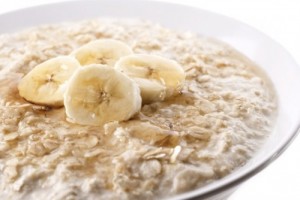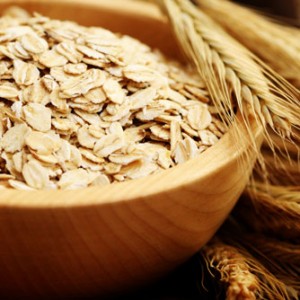-
Oatmeal: Have a Bowl of Heart Health!
Monday, July 7th, 2025by Dr. Janet Brill, Registered Dietitian
 Did you know that oatmeal in many ways is your heart’s best friend? Oatmeal is a whole grain food and complex carbohydrate that forms the backbone of the heart-healthy Mediterranean style of eating.
Did you know that oatmeal in many ways is your heart’s best friend? Oatmeal is a whole grain food and complex carbohydrate that forms the backbone of the heart-healthy Mediterranean style of eating. Consuming whole grains as a main form of carbohydrate nourishment has been scientifically shown to protect your heart, cutting the risk of coronary artery disease by an amazing 40 percent!
In my book Prevent a Second Heart Attack: 8 Foods, 8 Weeks to Reverse Heart Disease, I point out that eating whole grains, like oatmeal, is a key to heart health.
The Healthy Heart Benefits of Eating Whole Grains
Research shows that individuals who eat a diet abundant in whole grains are less likely to experience a fatal heart attack.
Whole grains are one of my 8 key food groups – along with extra virgin leafy greens, olive oil, salmon and other seafood, figs and other fruits, lentils and other legumes, walnuts and flaxseed, and red wine – that are part of my plan to reverse heart disease, or build good heart health to hopefully avoid heart troubles. Dark chocolate is a bonus food in this plan. Yippee!
Natural whole grains are made up of three botanically-defined parts: the bran, the endosperm, and the germ (or embryo). By eating the whole seed, or “kernel,” with the three parts intact (the entire complex), you are eating a complete whole grain that is loaded with nutrition.
How can you be sure that what you buy at the grocery store is indeed a whole grain? Look on the list of ingredients for words that signify whole grains:
- The words “rolled oats” and “oatmeal.”
- The term “100% whole wheat.”
- The word “whole” listed before a grain such as “whole rye flour.”
- The words “berries” or “groats,” such as “wheat berries” or “oat groats.”
- “Brown rice” and “wild rice.”
Try to Eat 3 or More Servings of Whole Grains a Day
Consuming whole grains on a daily basis is good for the heart. Eating at least three servings of whole grains each and every day can boost your heart disease defense system by:
- Preventing and treating metabolic syndrome and type 2 diabetes. Eating whole-grains will lessen your risk of contracting metabolic syndrome—the constellation of metabolic disturbances that predisposes you to developing type 2 diabetes and accelerates atherosclerosis.
- Helping you control your weight. The high fiber and high water content of whole grains lessen weight gain by promoting satiety. Whole-grain foods also contain fewer calories than the equivalent weight of a refined grain.
- Increasing your body’s antioxidant level—whole grains are virtual antioxidant factories, housing a nice amount of vitamin E, the mineral selenium, and the polyphenol phenolic acids ferulic acid and caffeic acid.
- Immunizing “bad” LDL cholesterol against free radical attacks.
- Lowering your “bad” cholesterol level, thereby stabilizing vulnerable plaque.
- Lowering your blood pressure.
Here are a few other suggestions to help you get at least three servings of whole grains a day:
- Make oatmeal your breakfast of choice on most days of the week. Cook up a large batch of the steel-cut version, which is highest in beta-glucan. Steel cut oatmeal takes longer to cook but is well worth it for the superior taste, texture, and health benefits. Keep a large stash of cooked oatmeal in the refrigerator (in a sealed container), portion out and heat daily servings for a heart-disease-reversing breakfast in minutes.
- Be adventurous and expand your grain repertoire with interesting new tastes such as amaranth, quinoa, and spelt.
- Try a recipe with barley, a delightfully tasty and wholesome grain that contains all the cholesterol-lowering heart-healthy ingredients of oatmeal. Perhaps a barley risotto, barley added to stew or salad, a barley pilaf, or a comforting barley soup on a cold winter’s day.
- Snack on popcorn, a tasty and filling snack that’s good for your heart and your waistline. Avoid the theater popcorn or microwave bags and instead go with the antique hot-air popper, or better yet, pop the kernels in a brown paper lunch bag in the microwave. Season it with a few sprays of olive oil and a touch of Parmesan cheese or brown sugar – depending on if you crave salty or sweet.
- Substitute 100 percent whole-wheat toast for bagels and 100 percent whole-grain muffins for pastries. Make all your sandwiches with 100% wholegrain bread or pita.
- Have a slice of veggie pizza made with whole-grain crust for lunch.
A healthy way to start your day is a morning bowl of oatmeal which delivers plaque-fighting, nutrient-dense benefits that last all day long. Oats are an energy-yielding complex carbohydrate that keep you fuller longer, by slowly releasing glucose into your bloodstream.
Oats are the King of Grains
 Better still, oats house a rare type of soluble fiber called beta-glucan, a highly effective LDL-lowering substance. Oats are #1 when it comes to soluble fiber, having the highest proportion of any whole grain.
Better still, oats house a rare type of soluble fiber called beta-glucan, a highly effective LDL-lowering substance. Oats are #1 when it comes to soluble fiber, having the highest proportion of any whole grain. Oats also contain insoluble fiber, which benefits your digestive health. Use oatmeal in cooking to add taste and nutrition to your favorite dishes.
You will probably be surprised at how the taste of certain foods truly comes alive with the addition of this hearty, healthy, class of super foods. Dr. Janet’s Oatmeal, Walnut and Flaxseed Pancakes (page 273) and Dr. Janet’s Steel-cut Oats with Fresh Fruit and Walnuts (page 271) are some yummy recipes included in Prevent a Second Heart Attack that feature oatmeal and are sure to please your taste buds!
(published June 29, 2012)
 Janet Brill, Ph.D., R.D., LDN, is a leading diet, nutrition, and fitness expert specializing in cardiovascular disease prevention. She is the author of Cholesterol Down: 10 Simple Steps to Lower Your Cholesterol in 4 Weeks – Without Prescription Drugs (Three Rivers Press, 2006), and Prevent a Second Heart Attack: 8 foods, 8 Weeks to Reverse Heart Disease (Three Rivers Press, Feb. 2011). To learn more about Dr. Janet, get delicious heart-healthy recipes, or buy her books, please visit DrJanet.com or PreventaSecondHeartAttack.com.
Janet Brill, Ph.D., R.D., LDN, is a leading diet, nutrition, and fitness expert specializing in cardiovascular disease prevention. She is the author of Cholesterol Down: 10 Simple Steps to Lower Your Cholesterol in 4 Weeks – Without Prescription Drugs (Three Rivers Press, 2006), and Prevent a Second Heart Attack: 8 foods, 8 Weeks to Reverse Heart Disease (Three Rivers Press, Feb. 2011). To learn more about Dr. Janet, get delicious heart-healthy recipes, or buy her books, please visit DrJanet.com or PreventaSecondHeartAttack.com.


